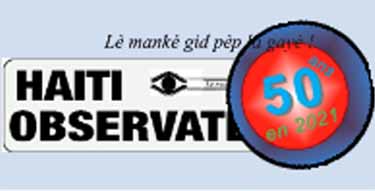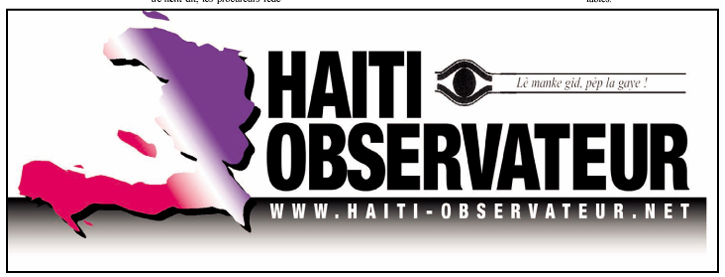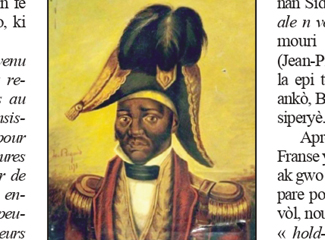HAPPENINGS !
It’s happening tomorrow : The annual Benefit for Promoting Health in Haiti (PHH) by RAJ
Since the 2010 earthquake, this organization has been training nurse practitioners in Haiti in a program that’s unique in the Caribbean region. Each year PHH organizes a fundraising event to support the work. This year, the event will take place tomorrow, October 25, beginning at 6:30-7:30 pm with a cocktail hour and dinner at 7:30, at the Vetro’s Restaurant, 164l-49 Cross Bay Boulevard in Howard Beach, N.Y. The cost is $120 per person. Other than music, there will be a silent auction and a raffle. Available : Free valet parking. For information, call 347-731-6143 or 718-565-5978. On November 4, 2017 their first group of 19 nurse practitioners graduated. Several of them will be at the event. See details about the organization on page ____.
Last week, the Happenings column began with “It’s happening as you read this: All of Haiti is standing up against corruption, as the people target the authorities who have failed to address the dilapidation of the $3.8 billion PetroCaribe Fund.” It’s time for a report of what really happened.
Indeed, in all of Haiti’s major cities the people demonstrated, for the most part peacefully. Estimates of the crowds vary from two to three million, with about one million in Port-au-Prince and surroundings. Considering that there were 83 designated staging places throughout the country, the figures aren’t exaggerated.
Violence first occurred at Pont Rouge, at the northern entrance to the capital, at the spot where Jean-Jacques Dessalines, the liberator of Haiti, was assassinated on October 17, 1806, a mere two years after he had declared Haiti’s independence. Keeping up with tradition, President Moïse with his wife and other high government officials, including the Prime Minister, went to pay their respects to the Father of the Haitian nation. As usual, he was to put a mammoth bouquet of flowers at the base if the monument for the fallen hero.
The officials were met with stones coming from several directions. The president dropped the flowers, as his security detail rushed him and his wife to their armor-plated vehicle and fled the area. Blood flowing down the face of a security guard that accompanied the Prime Minister testifies to the violent confrontation. This was a bad omen, most people thought. The day, some said, will be marred in blood. Not so.
The president was again made aware that he can’t freely travel without being a target.
Again, to keep up with tradition, he was going to Marchand-Dessalines, the town in the Artibonite region that served as capital to Emperor Dessalines. Before his caravan reached St. Marc, the road was blocked by people shouting, “Where is the Caribe money.” The president and his wife were whisked away and taken by helicopter to Marchand-Dessalines. His ministers arrived late, long after the service had begun. The whole Diplomatic Corps was absent. Understandably so, because the previous week, various embassies warned their employees to stay home, beginning on the 16th.
Late afternoon, on the 17th, when the president and his entourage were heading back to Port-au-Prince, they went through St. Marc at high speed. Meanwhile, it was learned that eight (8) young men who were among the organizers of events in St. Marc were arrested. In other words, for the caravan to cross St. Marc, official violence had to be used. Monday afternoon (the 22nd), those who were arrested on Wednesday (the 17th) were freed. Announcing their liberation, the human rights lawyer André Michel credited Arsène Dieujuste, a colleague lawyer from Gonaïves for obtaining their release. Attorney Michel said that Mr. Dieujuste represented him in court, at no cost. He added, “We now have a network of lawyers throughout the country to assist freely all those who must appear in court. The struggle requires solidarity.”
President Moïse, feeling the pressure of october 17, states : “Those who took PetroCaribe money must pay it back.”
During a lengthy speech at the Catholic Church in Marchand-Dessalines, the president
declared that he is “in solidarity” with the people who demand an accounting for the billions of dollars that disappeared without leaving a trace. He railed against 25 companies that got funds for projects that were not completed or never undertaken; the State will be pursue them, he said, adding that government officials involved in the PetroCaribe heist “should put themselves at the disposal of Justice.”
The next morning, the 18th that is, President Moïse took to twitter, writing, “All who used Petro Caribe must give some accounting. . . . Those who took Petro-Caribe money must reimburse the money before they go to jail.” He repeated what he had said about some companies. “All those companies which bagged the money of the citizens and which didn’t do the work they signed to do will be pursued wherever they are, according to the law. I am asking the legal representatives of the government to assume their responsibility in this case and do what must be done, according to the law.”
On Monday, October 22, the Palace issued an executive order published in Le Moniteur, the State’s gazette, in which the president dismissed the two top officials working for him. A new cabinet director, Nahomme Dorvil, replaces Wilson Laleau, whose name appears in two senatorial ethics reports as having been involved in the PetroCaribe heist. Involved also in PetroCaribe shenanigans was the Secretary General at the Palace, Yves Germain Joseph, who lost his post to Jean Hilbert Lebrun.
He also fired sixteen other senior advisers and advisers to the Presidency. He did not spare even Georges Stanley Lucas, in Washington, who was a foreign affairs adviser.
On Tuesday, Prime Minister Jean-Henry Céant announced another commission to look into the PetroCaribe scandal. In a tweet, he said, “the government has put together a group of national experts to analyze all the documents that have been received in regard to the PetroCaribe dossier. Also, we are calling on a foreign firm with accounting expertise to carry out an audit to finalize the work of the independent commission.”
Even before the Prime Minister sets up his commission, Gary Bodeau, the president of Haiti’s Lower House, said he disagrees. In a tweet that same day, Deputy (Congressman) Bodeau said, “The government must be careful not to politicize the PetroCaribe dossier. I wonder how a commission can replace constitutional institutions and legal ones it has created to investigate and parcel out justice.” Other than the Senate, which is a constitutional entity, the government also has set up agencies to deal with financial hanky-panky in the administration and in the country. They are the CSCCA, the Superior Council of Accounting and Financial Disputes; the ULCC, the agency dealing with corruption especially in banking operations nationally; UCREF, another agency that deals with money laundering, especially targeting political officials. Moreover, there is the Justice Department. In other words, coming with another commission of civilians is tantamount to disenfranchise those legally and constitutionally responsible to oversee government expenditures, as if they are incompetent. As someone has said, “Always create a commission when you don’t want to solve the problem.”
Anyway, the Haitian government should not take for granted the peaceful nationwide demonstrations of October 17. Already the PetroChallengers are getting ready for November 18, the date marking the defeat of the French in 1803, setting the stage for the declaration of independence on January 1, 1804. As we interpret the mood of the public, the next demonstrations, if there must be, will mean wiping out Haiti’s current leadership. We are still not out of the woods! RAJ, october, 24, 2018
this article is issue from the weekly edition of Haïti-Observateur on october 24 2018 and will be found in P. 1, 16 at : http://haiti-observateur.org/wp-content/uploads/2018/10/H-O-24-octob-2018.pdf




